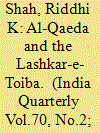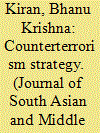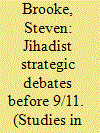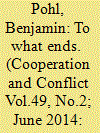| Srl | Item |
| 1 |
ID:
132298


|
|
|
|
|
| Publication |
2014.
|
| Summary/Abstract |
Study of ideology is one of the most important domains of consideration for a successful counter-terrorism strategy. It is necessary to know and understand the ideology of a terrorist outfit coupled with the ongoing evolution at the same, its chief ideologues and its target audiences in order to provide an alternative ideology or in other words to win the 'hearts and the minds' of the people. This article traces the mounting similitude in the discourse and the actions of Lashkar-e-Taiba and the ideology of Al-Qaeda. The article begins with a brief depiction of the debate on the 'end of ideology' before proceeding on to an examination of Al-Qaeda's ideology. In the next section, LeT's discourse and actions from 1990 to 2010 are scrutinised followed by an analysis that attempts to draw out parallels between the ideologies of the two terrorist organisations. In the last section, the conclusion raises several pertinent points for the consideration of counter-terrorist specialists and policy makers.
|
|
|
|
|
|
|
|
|
|
|
|
|
|
|
|
| 2 |
ID:
100432


|
|
|
| 3 |
ID:
080940


|
|
|
|
|
| Publication |
2008.
|
| Summary/Abstract |
In 2004 Lia and Hegghammer observed a new genre of "jihadi strategic studies," characterized by secular-rational analyses, familiarity with Western sources, and a willingness to self-critique. Through four case studies (the strategies of takfir groups in 1960/1970s Egypt, the far enemy-near enemy debate, the differing revolutionary modes of Al Jihad and Gamaa Islamiyya, and the decision by Al Qaeda to target the West) this article finds that many of the traits observed by Lia and Hegghammer have deep roots among jihadist thinkers. This article will interest those who study terrorism, strategy, and the history of Islamic militancy
|
|
|
|
|
|
|
|
|
|
|
|
|
|
|
|
| 4 |
ID:
132328


|
|
|
|
|
| Publication |
2014.
|
| Summary/Abstract |
Since the EU's Common Security and Defence Policy framework became operational in 2003, the Union has undertaken more than 20 crisis management operations. The drivers behind this activity remain debated. This article proposes a fresh interpretation based on governmental interests as defined by domestic political risks and opportunities. It argues that EU governments have tailored Common Security and Defence Policy action so as to satisfy domestic audiences. By way of illustration, this article examines the most ambitious Common Security and Defence Policy operation to date, the EU Force mission in Chad and the Central African Republic, as well as a deliberate non-intervention in a comparable case, in the eastern Democratic Republic of Congo in late 2008. By analysing the positions of the most relevant EU governments in each respective case, this article demonstrates how they corresponded to domestic political logic. Drawing on some 20 interviews with policy-makers, this article provides a theoretical account explaining the motives behind Common Security and Defence Policy decision-making rooted in original empirical evidence. The explanation for the haphazard pattern of Common Security and Defence Policy operations thus far can be found in the link between domestic politics and EU crisis management operations.
|
|
|
|
|
|
|
|
|
|
|
|
|
|
|
|